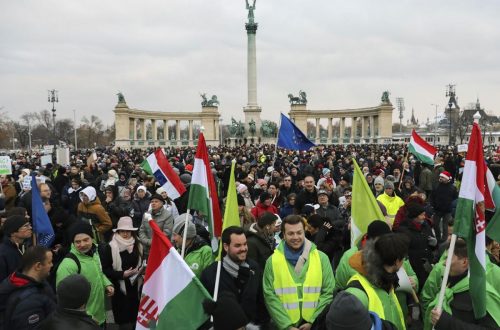Having failed to take serious measures to diversify the economy or to set aside a substantial reserve fund while oil prices ranged above $100 per barrel, the Venezuelan government is now in dire financial and political straits as oil prices continue to collapse.
President Nicolás Maduro, struggling with an economic crisis compounded by falling oil prices, said Tuesday he authorized a 20% cut in government spending and plans to modify the country’s complicated foreign-exchange system, opening the door to a possible devaluation.
The moves could shore up the country’s fragile finances but are also likely to deepen an economic downturn and pose a major political risk to Mr. Maduro, whose predecessor Hugo Chávez built a successful political machine based on government spending for the poor.
…..
In a country that was already spending beyond its means for the past several years, the falling oil price stands to worsen the country’s finances. Venezuela’s fiscal deficit—the difference between what it spends and earns—stands at about 17% of annual economic output, a level economists say is unsustainable.
…..
Underscoring the challenge facing Mr. Maduro, his popularity sank to a new low of 24.5% in November, down 5.7 percentage points from September, according to a poll by respected local pollster Datanalisis on Tuesday. Nearly 86% of the 1,293 homes surveyed said the country was headed in the wrong direction.Venezuela’s economy is expected to contract by 3% this year, with an inflation rate topping 60% and a dollar crunch that has created frequent shortages of imported food and consumer goods. The falling price of oil sets the stage for worse to come.
Oil revenues account for roughly 96 percent of Venezuela’s export earnings and about 45 percent of budget revenues
So it’s no surprise that Maduro’s regime is trying to deflect public attention from its own failures by blaming the political opposition for seeking to undermine and sabotage the government.
Last February Maduro ordered the arrest and imprisonment of Leopoldo Lopez, leader of the opposition Voluntad Popular party, for his nonexistent role in a violent confrontation in Caracas.
Lopez’s trial has been repeatedly delayed. The court has rejected calls for his release by the UN Working Group on Arbitrary Detention.
In November envoys from the Socialist International– led by José Antonio Viera-Gallo, a prominent Chilean lawyer and former speaker of the Chilean Chamber of Deputies– were prevented from visiting Lopez in prison.
The prison authorities denied them access under the pretext that Leopoldo López was affected by a disciplinary measure that prevented him from receiving visitors because he, together with the other political prisoners, had hit their cell bars with their cutlery in protest at the lack of resolution by the judge assigned to their case to respond to the request for freedom made by the UN Special Group on Arbitrary Detention.
While access was being requested, Leopoldo López and his comrades lifted a written sign between the bars of their cells regarding their imprisonment and exchanged greetings with their families, highlighting the infringement of their rights. In reply, the guards sounded the siren of a military vehicle to silence their voices, provoking a deafening noise.
Now the desperate regime has indicted another opposition leader, Maria Corina Machado, on equally ridiculous charges of plotting to kill President Maduro.
At Caracas Chronicles, Francisco Toro observes:
Consider. Since 2010, María Corina Machado has been accused of ordering buses burned. Of instigating lawlessness. Of seeking to generate chaos and panic. Of infiltrating provocateurs into queues for scarce basic goods. Of palling around with Lorent Saleh. Of killing six guards. Of killing Robert Serra. Of plotting to kill the president, (on the basis of forged evidence). Of paying a hacker to delete the evidence against her. Of “plotting a silent coup.” Of “seeking a civil war.” Of conspiracy. Of murder. Of terrorism. Of treason.
She’s been called an “enemy of the people.” A “shake-down artist of the empire.” A “whore of the empire“. A “hydra-headed monster of coup-plotting“. An “imbecile sell-out lackey.” “Evil for the people.” “The worst the homeland has borne.” “The face of fascism.”
She’s been threatened with detention at INOF, the notoriously violent women’s prison in Los Teques. She’s been told a jail cell is ready for her.
She’s been banned from leaving the country. Stripped of her parliamentary immunity. Stripped of her seat in parliament. Denied any forum to defend herself or present evidence to challenge this decision.
And yet strangely, and unlike Lopez, this woman who allegedly poses such a clear and present danger to the state has not yet been jailed.
It shouldn’t come as a shock that Venezuela was one of 19 countries in the UN General Assembly to vote against referring North Korea to the International Criminal Court for crimes against humanity.


